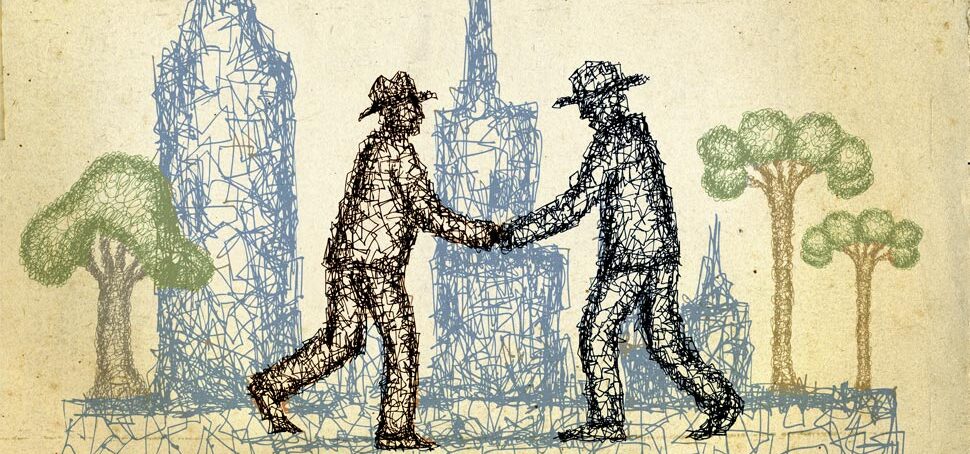Evangelism in the Twenty-first Century
Today we live in an increasingly fragmented society where true friendships are difficult to find. George Gallup Jr., describes our isolation when he writes: “We are physically detached from each other. We change places of residence frequently. One survey revealed that seven in ten do not know their neighbors. As many as one-third of Americans admit to frequent periods of loneliness, which is a key factor in the high suicide rate among the elderly.”
If we are to reach today’s generations with the gospel, we must invite them to experience the love and unity that only Jesus Christ can bring. In this section, we’ll look at some practical ways of doing this.
Understand that evangelism must be a team effort. Many Christians feel the pressure of having to share their faith one-on-one with non-Christians. But Jesus never intended for us to be isolated in our efforts to reach others. One of the best things we can do is to introduce our non-Christian friends to other believers. Pastor John Burke writes, “In today’s post-Christian context, people often need the intersection of three elements in order to find faith and become the church:
- A friendship with someone who truly acts like Jesus—listening, caring, serving, and talking openly about faith in a non-pressuring way.
- Relationship with a ‘tribe’ of four to five other Christians whom they enjoy hanging out with and who make them feel like they truly belong.
- A ‘come as you are’ learning environment where they can learn, usually for six to eighteen months, about the way of Jesus.”
Invite non-Christians to your small group. In many churches today, small groups have become a vital component for providing fellowship with other Christians. Unfortunately, most small groups today are limited to believers, and the thought of inviting a non-Christian friend or neighbor seems inappropriate. That’s unfortunate. What better context could there be for allowing unbelievers to see the love and unity we experience as we pray together and care for each other’s daily needs?
But the members of your small group must realize that some non-Christians may express doubts about the Bible, use language that is offensive, or step outside briefly to smoke a cigarette. If we are to provide a “come as you are” learning environment, then we must not expect unbelievers to act like believers.
Invite them to your church. If you aren’t part of a small group—or even if you are—you should consider inviting your non-Christian friends to church. Many church services include a simple presentation of the gospel, and sermons focus on showing how the Bible relates to our daily lives in practical ways. Not long ago, a pastor invited me to join him for lunch with a woman who was a former lesbian. She told me that she first came to his church when she learned he would be preaching a seven-week sermon on sexuality. What really caught her attention was that the final week of the series was devoted to same-sex relationships. The woman couldn’t believe that a church would actually discuss such issues, and she decided to attend the entire series. Not only were many of her questions answered, but also she was surprised and delighted that people welcomed and accepted her. A few months later, she became a Christian and eventually joined the staff of the church, focusing her ministry on those who struggle with their sexuality.
Participate with other Christians in church service projects. Many churches today offer service opportunities to the surrounding community that small groups and Sunday-school classes can participate in. One church lists the following service projects on their website:
Host a refugee family: Assist refugees in acclimating to life here by helping them navigate the bus system and learning how to grocery shop! Consider volunteering through any number of organizations.
Tutoring: Every Monday night elementary-aged children gather at the Capitol Village apartments to receive help with homework and school projects. Volunteers are needed to help provide assistance and aid to these children! There is also need for 1-1 tutoring throughout the week based on availability.
Paper ministry: Resettled refugees have come to know the US as the “Paper Nation” as the list of paperwork they need to complete seems unending! Two Thursdays a month, refugees and volunteers gather at the Timber Apartments on Clayton Lane to collectively fill out the forms and applications needed to get by. Consider volunteering today!
Giving tree: Every Christmas season our church provides gifts, coats and household items for the refugee communities. Volunteers are needed on a seasonal basis to help with the coordinating and execution of the Giving Tree, as well as with the wrapping and delivering of gifts.
As you seek to “love your neighbor as yourself” alongside other concerned Christians, people in your community will receive both material and spiritual benefits. They will discover that followers of Christ not only love each other but also those in need. Throughout history, many people have become open to the gospel message only after seeing Christ’s love in action through his body, the church. As Jesus said, “Let your light shine before others, that they may see your good deeds and glorify your Father in heaven” (Matthew 5:16).
This article is excerpted from Evangelism: Reaching Out through Relationships, a Discovery Series resource from Our Daily Bread Ministries. To read the rest of the article click the link. To read hundreds of other biblical resources to grow your relationship with God, click the banner below.


